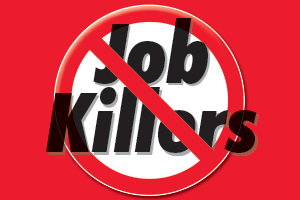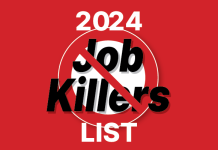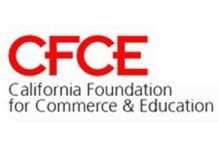 The California Chamber of Commerce released its annual job killer list yesterday, which includes 10 bills that threaten California’s economic recovery and would hurt the ability of employers to rehire or maintain employment of California workers should they become law.
The California Chamber of Commerce released its annual job killer list yesterday, which includes 10 bills that threaten California’s economic recovery and would hurt the ability of employers to rehire or maintain employment of California workers should they become law.
“It’s truly unfortunate—and, quite astonishing—that anyone in the legislature would unnecessarily increase costs on California’s distressed employers and reduce employment opportunities for California workers,” said CalChamber President and CEO Allan Zaremberg.
“Nearly four million Californians have filed for unemployment benefits and many more are without work-related income. Our legislature should focus solely on keeping California employers and workers in business,” said Zaremberg.
The CalChamber will periodically release job killer updates as legislation changes. Reporters are encouraged to track the current status of the job killer bills on www.CalChamber.com/jobkillers or by following @CalChamber and @CAJobKillers on Twitter.
The 2020 job killer list includes the following bills:
- AB 196 (Lorena Gonzalez; D-San Diego) Establishes Costly “Conclusive Presumption” of Injury. Significantly increases workers’ compensation costs for employers by “conclusively” presuming (non-rebuttable) that contraction of COVID-19 by all “essential workers” is a workplace injury. Establishes an extremely concerning precedent for expanding presumptions into the private sector for COVID-19 issues, which the Workers’ Compensation Insurance Rating Bureau (WCIRB) recently estimated will add billions in costs to California’s workers’ compensation system.
- AB 664 (Cooper; D-Elk Grove) Establishes Costly “Conclusive Presumption” of Injury. Significantly increases workers’ compensation costs for public employers and public and private hospitals by “conclusively” presuming (non-rebuttable) that exposure or contraction of communicable diseases, including COVID-19, are caused by the workplace and defines required compensation to include non-workers’ compensation items such as “temporary housing costs.” Establishes an extremely concerning precedent for expanding presumptions into the private sector for COVID-19 issues, which the Workers’ Compensation Insurance Rating Bureau recently estimated will add billions in costs to California’s workers’ compensation system.
- AB 1107 (Chu; D-San Jose) Massive Unemployment Insurance Compensation and Tax Increase. Would significantly raise employers’ payroll taxes to fund a 130% increase in unemployment payments just as California’s businesses are struggling to survive a pandemic-caused shutdown.
- AB 2992 (Weber; D-San Diego) Expanded Leaves of Absence. Expands three separate leaves of absence on small and large employers with multiple threats of litigation despite the enormous financial strain all size employers are dealing with as a result of the COVID-19 pandemic. This increased burden will limit employers’ ability to recover, including limiting their ability to rebuild their workforce.
- AB 2999 (Low; D-Campbell) New Protected Leave and Threat of Litigation. Imposes a significant new burden on employers of every size by mandating that they provide employees up to 10 days of bereavement leave upon the death of a spouse, child, parent, sibling, grandparent, grandchild, or domestic partner, regardless of how long the employee has worked for the employer. The bill further opens up new avenues for litigation against California employers by establishing a new private right of action (in addition to liability under the Private Attorneys General Act (PAGA) and administrative enforcement through the Division of Labor Standards Enforcement).
- AB 3075 (Lorena Gonzalez; D-San Diego) Public Shaming and Local Wage Standards. Provides for public shaming of corporations and interference with corporate formation based on arbitrary, unclear and unfair standards. The bill would also result in chaotic and inconsistent enforcement of wage and hour laws by local jurisdictions by authorizing them to impose their own wage payment requirements as long as they are “at least as stringent” as state law requirements.
- AB 3216 (Kalra; D-San Jose) New COVID-19 Employment Leave Mandate. Provides for unlimited job protected leave for all employees of employers of any size for family and medical leave due to COVID-19. This new mandate is in addition to numerous COVID-19 leave requirements recently enacted at the federal, state and local levels. The bill creates additional burdens on California employers at a time they can least afford it.
- SB 893 (Caballero; D-Salinas) Expands Costly Presumption of Injury. Significantly increases workers’ compensation costs for public and private hospitals by presuming that certain diseases (including COVID-19) and injuries are caused by the workplace and establishes an extremely concerning precedent for expanding presumptions into the private sector.
- SB 950 (Jackson; D-Santa Barbara) Expansion of CEQA. Would expand the California Environmental Quality Act’s existing requirements by adding costly new mandates that will burden local agencies, add substantial time and costs to the CEQA process and provide project opponents with new legal arguments to delay or block housing and other projects.
- SB 1399 (Durazo; D-Los Angeles) Increased Costs and Liability on Employers. Imposes unfair and onerous burdens on any essential business in the apparel industry, including a $600,000 bond to operate, which will force businesses to reduce their workforce or close down their business, given the financial strain they are already under from this pandemic.
Cumulative Job Killer Vetoes
2019: 31 Job Killers identified, 2 sent to Governor Gavin Newsom, 1 vetoed;
2018: 29 Job Killers identified, 1 sent to Governor Edmund G. Brown Jr., 1 vetoed;
2017: 27 Job Killers identified, 3 sent to Governor Brown, 2 signed, 1 vetoed;
2016: 24 Job Killers identified, 5 sent to Governor Brown, 4 signed, and 1 vetoed;
2015: 19 Job Killer bills identified, 3 sent to Governor Brown, 1 signed, and 2 vetoed;
2014: 27 Job Killer bills identified, 2 sent to Governor Brown, 2 signed;
2013: 38 Job Killer bills identified, 1 sent to Governor Brown, 1 signed;
2012: 32 Job Killer bills identified, 6 sent to Governor Brown, 4 signed, 2 vetoed;
2011: 30 Job Killer bills identified, 5 sent to Governor Brown, 1 signed, 4 vetoed;
2010: 43 Job Killer bills identified, 12 sent to Governor Arnold Schwarzenegger, 2 signed, 10 vetoed;
2009: 33 Job Killer bills identified, 6 sent to Governor Schwarzenegger, 6 vetoed;
2008: 39 Job Killer bills identified, 10 sent to Governor Schwarzenegger, 1 signed, 9 vetoed;
2007: 30 Job Killer bills identified, 12 sent to Governor Schwarzenegger, 12 vetoed;
2006: 40 Job Killer bills identified, 11 sent to Governor Schwarzenegger, 2 signed, 9 vetoed;
2005: 45 Job Killer bills identified, 8 sent to Governor Schwarzenegger, 1 signed, 7 vetoed;
2004: 23 Job Killer bills identified, 10 sent to Governor Schwarzenegger, 10 vetoed;
2003: 53 Job Killer bills identified, 13 sent to Governor Gray Davis, 11 signed, 2 vetoed;
2002: 35 Job Killer bills identified, 17 sent to Governor Davis, 12 signed, 5 vetoed
2001: 12 Job Killer bills identified, 5 sent to Governor Davis, 3 signed, 2 vetoed;
2000: No Job Killers identified. Of 4 bad bills identified at end of session, Governor Davis signs 2 and vetoes 2.
1999: 30 Job Killer bills identified, 9 sent to Governor Davis, 6 signed, 3 vetoed;
1998: 64 Job Killer bills identified, 11 sent to Governor Pete Wilson, 11 vetoed.
1997: 57 Job Killer bills identified, 9 sent to Governor Wilson, 9 vetoed.



